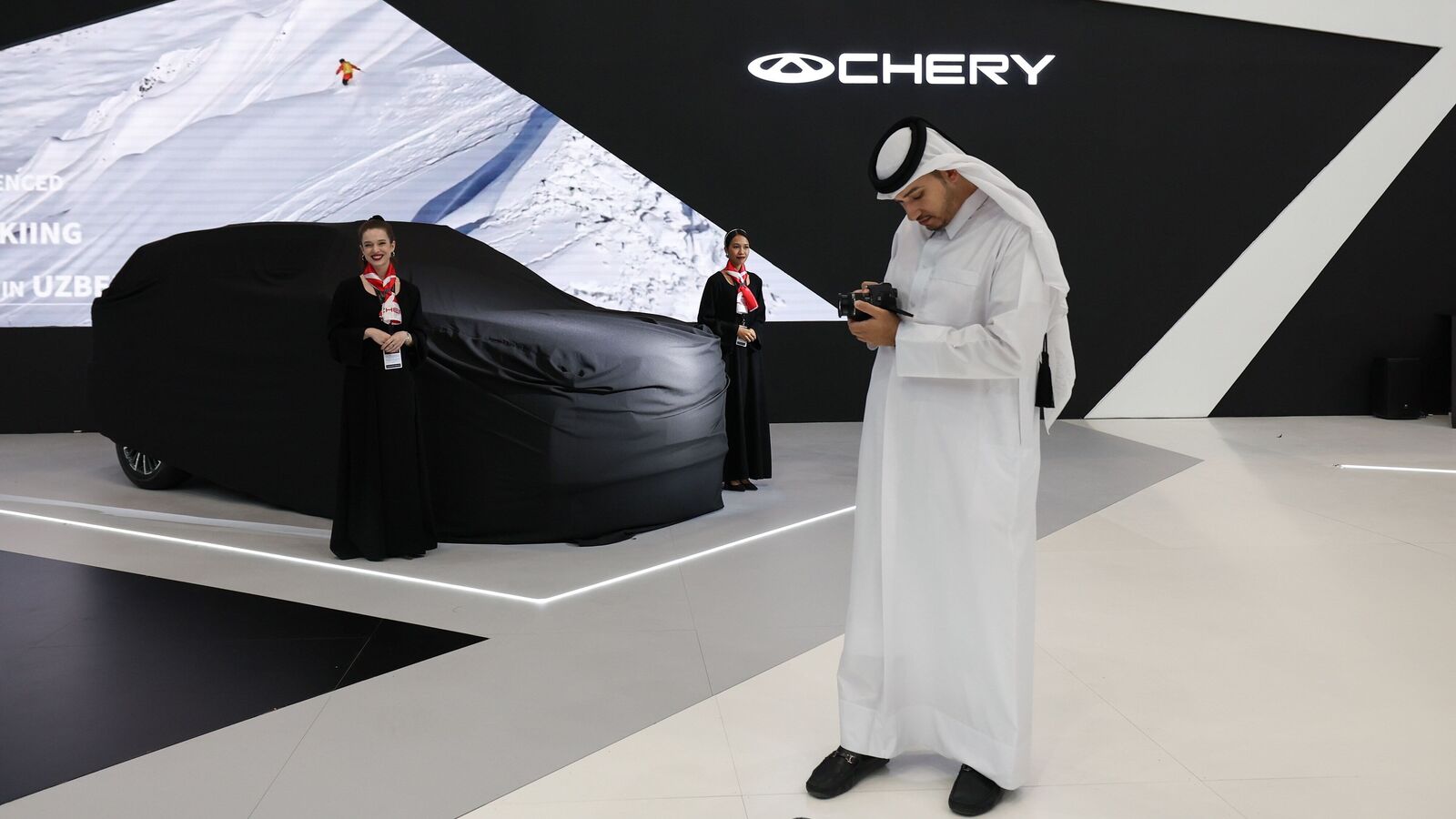With EV demand slowing at home, and companies facing substantial import tariffs in the US as well as a European Union probe into Chinese subsidies, automakers view the region as a major growth opportunity that, so far, is largely untapped. Across the six Gulf states, including oil majors Saudi Arabia and the United Arab Emirates, electric cars account for just 0.4% of the passenger-vehicle market.
That’s got some of China’s best-known automakers flocking to the region. Chery Automobile Co. is planning to launch at least two new hybrids or EVs, while Xpeng Inc. and Zhejiang Geely Holding Group Co.’s premium Zeekr brand have started selling in Israel and making plans to expand into more countries in the region, including Qatar and Bahrain.
But Chinese firms’ efforts to build their presence face a raft of challenges, from simple economics — fuel is generally cheap in major oil producing countries — to a lack of brand awareness among potential buyers, scarce charging infrastructure and concerns about how well car batteries can handle the brutal heat of a Middle East summer.
“I think in the Middle East, it’s a mix. EVs are not ready in many places. As an idea, it’s great but growth is still very slow here. We do have EV cars in our company but the number of sales and inquiries are less,” said Ahmad Firoozi, a marketing manager from the Qatari distributor Nasser Bin Khaled Automobiles, which works with brands like MG Motor, and Geely-Volvo joint venture Lynk & Co.
There’s also the threat of the Israel-Hamas war escalating. Israel has vowed to destroy Hamas, which is designated as a terrorist group by the US and European Union, after the Oct. 7 onslaught by the militant group that left more than 1,400 Israelis dead.
Some of the top oil producers in the Middle East are making ambitious promises to transition away from the fossil fuels that have underpinned their economic growth, and shift to green technologies that are key to the world’s efforts to reduce emissions.
Also Read : Hyundai to build factory for EVs in oil-rich Saudi Arabia
The UAE is investing as much as 200 billion dirhams ($55 billion) by 2030 to transform its energy strategy, and has pledged that EVs and hybrid cars will make up more than 50% of the national fleet by 2050, from 4% currently.
Saudi Arabia this year greenlit a manufacturing plant for Ceer, its first homegrown EV brand that’s set to start selling cars in 2025, and recently opened another with California-based maker Lucid Group Inc. The kingdom has already signed a $5.6 billion deal with premium Chinese automaker Human Horizons Technology that reflects the region’s interest in higher-end vehicles. Separately, the Abu Dhabi government this year took a 7% stake in China’s Nio Inc.
Chinese brands made up 16% of the 616,500 new vehicles sold in Saudi Arabia last year. The Gulf country was also the second-largest importer of Chinese cars in 2022, behind Mexico, before dropping to fifth place this year as exports to Russia and Europe picked up. Marques like MG are seeing fast growth in the UAE, posting an 86% surge in the first three months of this year, according to local media reports.
BYD Co. topped the EV sales chart for Israel and ranked fourth overall in vehicle sales in the first nine months of 2023. Of the roughly 16,000 foreign-made EVs imported to a free-trade zone in Jordan’s central governorate of Zarqa in the first half of the year, about 80% were made in China.
Auto firms are likely to benefit from China’s deepening economic ties with the Middle East, just as escalating trade tensions with Europe and the US ripple through the EV sector and risk throttling the industry’s ambitions abroad. That’s made the region a welcoming investment prospect and could help Chinese companies more easily access potential new funds and even skirt tightening import regulations in Western markets.
Within the Middle East, consumer tastes are evolving. Customers now see Chinese vehicles as durable, reliable, and with capabilities on par with German, American or Japanese cars that make them worth the money, said Hesham Amer, a UAE-based auto distributor who has worked with brands such as Guangzhou Automobile Group Co.
Fuel economics are starting to change in favor of EVs, too. While it’s still relatively cheap to run a gas-guzzler in many places — petrol costs between $2.18 to $2.35 per gallon in Saudi Arabia and Qatar — it’s financially savvy to have an EV in some countries. In the UAE, where the government sets petrol pricing higher at $3.43 per gallon, it costs about $50 to fill up a small sport-utility vehicle, compared with around $10 to fully charge a similar sized EV, according to Amer.
“The Middle East is probably the most promising for Chinese automakers,” said Yale Zhang, managing director at Shanghai-based consultancy Autoforesight Co. Wealthy customers may be particularly interested in an EV that has innovative in-car technologies and can rapidly accelerate like a Porsche, he said.
Chinese firms are also looking at how they can allay concerns about whether cars made abroad can withstand the extreme heat, sand and dust of the Middle East.
Peter Matkin, the head of research and development for Chery’s high-end marque Exeed, said one way the brand tests its cars’ durability is to leave a vehicle outside for an entire day during summer to see how the environment impacts materials. Some vehicles not specifically engineered for the Middle East start to creak after being parked outside for extended periods of time, he said.
Battery performance is also a top concern for automakers and consumers alike. During summers in Doha, where temperatures can soar to 50C (122F), the time needed to charge an EV from a 50-kilowatt commercial charger increases to as long as two-and-a-half hours from the typical 40 to 45 minutes, according to Sertac Bayhan, a senior scientist at the Qatar Environment and Energy Research Institute, part of Hamad Bin Khalifa University.
High temperatures, along with the need to run air conditioning constantly, means batteries drain quicker. One EV that underwent testing at the institute showed a range drop from 350 kilometers (217 miles) in winter to just 200 kilometers in summer. Batteries also degrade much faster in hotter climes, with capacity shortened by about 70% to 75% during the standard 10-year warranty period.
Even surmounting the technological hurdles won’t guarantee market share for Chinese firms. Charging infrastructure is sparse in many Middle East countries — the UAE has less than 900 charging stations currently, though has vowed to install 30,000 by the end of 2050. And while opinions about the quality of ‘Made in China’ vehicles improves, most brands remain relatively unknown in the region.
At October’s Geneva International Motor Show, which this year took place in Doha, booths for Chinese brands like Chery and Lynk & Co. attracted groups of interested onlookers, but the biggest crowds flocked to legacy names like Porsche and Lamborghini.
Established Western brands are also looking to muscle in on the Middle East market in competition with Chinese EVs.
Mercedes-Benz Group AG’s local dealer launched at least three electric models at the Doha show and Selvin Govender, who heads the firm’s marketing and sales for the Middle East and Africa, said he’s already seeing customer interest. Mercedes has recorded double-digit growth in EV sales in the UAE, and single-digit growth in Saudi Arabia, he said. For some attendees, their curiosity about Chinese EVs will take time to translate into actual sales.
Wafa and Mohamed, a Doha-based couple in their 30s who asked not to be identified by their last names due to privacy concerns, are considering replacing one of their three cars — a Corolla, a Lexus and a Porsche — with a Chery vehicle. But worries about the battery-powered vehicles’ performance in the Qatari summers mean they’re not likely to purchase one any time soon. “Maybe when everyone else starts driving an EV, then we’ll think about it,” Wafa said.
First Published Date: 03 Nov 2023, 13:45 PM IST
Source link

